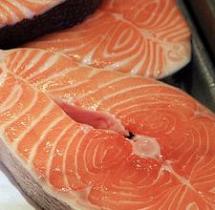Astaxanthin in Salmon linked to Anti-Aging
Bob Capelli is the Vice President of Cyanotech, the largest grower of astaxanthin in the world. Capelli has also co-authored some of the literature on astaxanthin.
Astaxanthin is now thought to be the most powerful antioxidant found in nature.
-- Astaxanthin is believed to be the most powerful antioxidant found in nature. Research has shown it can benefit your entire body, from preventing sunburn, to boosting athletic performance; preventing cataracts and the most common cause of blindness; preventing dementia, and treating the symptoms of inflammatory conditions such as arthritis
-- In one study, male athletes taking 4 mg of astaxanthin a day improved their strength three times faster than those taking a placebo; increasing the number of deep knee bends they were able to perform after six months of training by 62 percent, compared to 22 percent for the placebo group engaged in identical training
-- Nine human clinical studies have shown astaxanthin can prevent tired eyes by maintaining optimal motor function and protecting your eyes against damaging UV rays
-- While salmon, shrimp, lobster, crab and some other fish are good food sources of astaxanthin, it would be near impossible to reach therapeutic doses through your diet. Furthermore, farm raised varieties should be avoided at all cost, as they contain synthetic rather than natural astaxanthin, which is created from petrochemicals and may have unknown toxicities
It is one of the most amazing supplements I have ever learned about. The only one that exceeds it in importance to be taking every day, from my perspective, is vitamin D.
It is one of the most vital supplements I take, and one that I would not want to be without.
Astaxanthin is a derivative of the microalgae Haematoccous pluvialis (it's the part that give salmon and flamingos that eat the algae their orange or pink coloring).
It is produced when the algae's water supply dries up, forcing it to protect itself from ultraviolet radiation. It's the algae's survival mechanism—Astaxanthin serves as a "force field" to protect the algae from lack of nutrition and/or intense sunlight.
As an analogy, the way the algae produces astaxanthin is similar to the way your skin cells produce melanin in response to sun exposure.
The astaxanthin, just like melanin, protects the algae against excess ultraviolet radiation. Interestingly, one of the benefits of astaxanthin is actually its inherent ability to protect you against sunburn.
Internet site reference: http://articles.mercola.com/sites/articles/archive/2011/10/29/bob-capelli-on-astaxanthin.aspx?e_cid=20111029_DNL_art_1
Comments
There are 0 comments on this post














